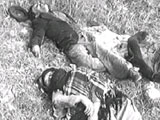|
|
TODAY.AZ / Politics
Thou shall not forget Hojali
25 February 2007 [14:40] - TODAY.AZ

The nearly 2,500 inhabitants of this small city attempted to flee the invasion. The invaders cut all escape routes for civilians in the city, and on this date the bloodiest day of the Azerbaijani-Armenian war in Nagorno Karabakh ended with the brutal massacre of 633 innocent people. Sixty-three of the deceased were children, 70 elderly and 106 women.
This Monday is the 15th anniversary of the Hojali massacre. Turkish people need to remember the atrocities perpetuated against their brethren on that night, not only because of the unacceptability of the killings and the war crimes but also because of the intentions of the killers.
Zori Balayan is one of the founding fathers of the greater Armenia ideology. In 1996 he wrote a book about the "revival of the Armenian soul" and gave a blunt description of the Hojali massacre. Recounting how Armenian soldiers nailed an Azeri child to a window and watched him die, Balayan says that they did what Turks did to their fathers. In the minds of the Armenian terrorists perpetrating the Hojali massacre, the ones that they killed were not Azeris but substitute Turks for the ones they could no longer reach.
In our belief, when it comes to human life, numbers do not work in the same way as in simple arithmetic. "Killing an innocent man is like killing the whole of humanity," says our Holy Book, referring to a Biblical verse. In that sense, I always found it unacceptable to discuss the number of the victims of the Holocaust. Ethically speaking, 3 million is no less than 6 million. What should be discussed is the intention, and the innocence of the victims.
The fallen of Hojali may not number in the thousands, but they were as innocent as newborn babies, especially with regard to the perceived atrocities the Armenians suffered in the 1915 deportations. The hatred was toward the Turkish people, yet the victims were the people of Hojali.
Looked at from the viewpoint of international politics, the Hojali massacre was also a message to the state and civil society of Turkey. The Soviet Bloc was crumbling. The Turks, moved with the prospects of an independent Azerbaijan, were looking forward to political and civil cooperation with the Azeri people. Civil society was discussing the possibility of opening schools, mosques and cultural centers in the land of our relatives. The government was preparing to share the Turkish experience in democracy and economic development. The sound that came from Hojali on that night was not only the eulogy of crying mothers but also of doors shut on the face of the Turkish people, running to help for the state-building to follow.
Doors were eventually opened. Azerbaijan is rebuilding its bright future now. This bright future may be even more dazzling than what the Turkish people were expecting in 1992. But Karabakh is still under Armenian occupation, and recent Armenian mobility against Turkey shows that the hatred that praised the nailing of children and watching them die stays there. This we shall not forget.
Not forgetting does not mean to long for revenge. Not forgetting means to take the precautions that similar atrocities shall not be perpetuated against the future generations, of neither Turks nor Armenians.
The Biblical verse continues: "Saving one soul is like saving the life of the whole humanity." And this necessitates not forgetting.
By Kerim Balci
/Todays Zaman/
URL: http://www.today.az/news/politics/37024.html
 Print version
Print version
Connect with us. Get latest news and updates.
See Also
- 23 February 2025 [08:30]
PM Shehbaz Sharif’s upcoming visit to Azerbaijan signals stronger bilateral relations - 22 February 2025 [11:05]
Reception held in Azerbaijan to mark 65th anniversary of Japanese Emperor Naruhito - 21 February 2025 [16:03]
Armen pinned to the wall, but he resists - 21 February 2025 [11:42]
Azerbaijan-OSCE cooperation discussed in Vienna - 21 February 2025 [11:11]
There is not and could not be an "Armenian heritage" in Agdam - 21 February 2025 [10:56]
President Ilham Aliyev receives Chairman of Turkish Parliament’s National Defense Commission - 21 February 2025 [10:45]
EU observers once again spotted monitoring Azerbaijani territories - 20 February 2025 [12:40]
Italian Senate backs resolution supporting Azerbaijan-Armenia peace process - 20 February 2025 [11:46]
President Ilham Aliyev awards Artur Rasizade 'Heydar Aliyev' order - 20 February 2025 [11:26]
Azerbaijan, Iran discuss strengthening parliamentary ties and regional cooperation
Most Popular
 US imposes duties on cars, semiconductors, pharmaceuticals and wood in March
US imposes duties on cars, semiconductors, pharmaceuticals and wood in March
 Turkiye strengthens energy role with Turkmen gas agreement
Turkiye strengthens energy role with Turkmen gas agreement
 Erdogan calls Istanbul talks important platform for parties to reach consensus
Erdogan calls Istanbul talks important platform for parties to reach consensus
 Azerbaijan’s firm stance dispels myths of pro-Russian allegiances
Azerbaijan’s firm stance dispels myths of pro-Russian allegiances
 Japanese Princess Kako may visit Brazil in June
Japanese Princess Kako may visit Brazil in June
 Financial gamble: Trump’s war on $200 billion spent in Ukraine
Financial gamble: Trump’s war on $200 billion spent in Ukraine
 Italian Senate backs resolution supporting Azerbaijan-Armenia peace process
Italian Senate backs resolution supporting Azerbaijan-Armenia peace process
